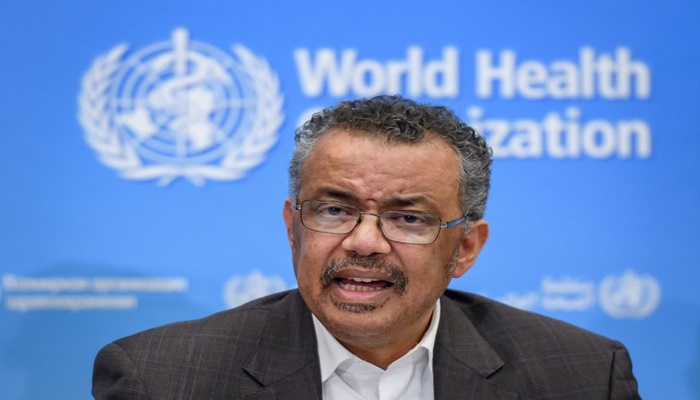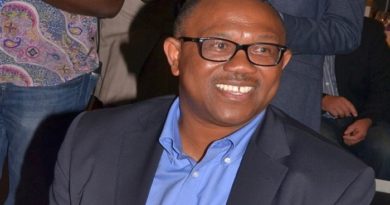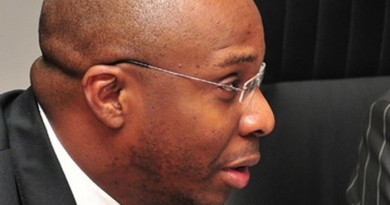COVID-19: WHO calls on nations for united front against pandemic
The World Health Organisation (WHO) on Tuesday called on nations to form a united front in an effort to battle the ravaging COVID-19 Pandemic.
The call was made at the COVID-19 Virtual Conference which was coordinated at the WHOs headquarters in Geneva, Switzerland.
The World Virtual Conference had in attendance, WHO Director-General, Dr Tedros Ghebreyesus, WHO Chief Scientist Dr Soumya Swaminathan, Dr Maria Van Kerkhove and Dr Mike Ryan.
The conference had Portuguese in addition to six UN languages, namely, Russian, English, French, Spanish, Arabic and Chinese.
The WHO Director-General, Dr Tedros Ghebreyesus, said the world body would continue to call for unity in the race to defeat the COVID-19 pandemic.
“The most important resource in the fight against COVID-19 is solidarity. The launch of the Access to COVID-19 Tools accelerator on Friday was a powerful demonstration of that solidarity.
“WHO is deeply grateful to the many world leaders and partners who have come together to ensure no-one misses out on life-saving vaccines, diagnostics or therapeutics.
“We look forward to more countries and stakeholders supporting this global collaboration and movement. This initiative is a vital investment in the response, both for the short term and the long term.
“Diagnostics are helping us now to find cases and ensure people are isolated and get the right care.
“We are hopeful that the solidarity trial will shortly help us to understand which therapeutics are the most safe and effective for treating patients,” he said.
Ghebreyesus added that the world would need a vaccine to control the virus.
“The success in developing effective drugs and vaccines for Ebola reminds us of the enormous value of these tools and the enormous power of national and international collaboration to develop them.
“WHO played a key role in the development of the Ebola vaccine and we are doing the same for COVID-19.
“Developing a COVID-19 vaccine has been accelerated because of previous work WHO and partners have done over several years on vaccines, for other Coronavirus, including SARS and MERS.
“Although COVID-19 is taking a heavy toll, WHO is deeply concerned about the impact the pandemic will have on other health services, especially for children.
“Children may be at relatively low risk from severe disease and death from COVID-19 but can be at high risk from other diseases that can be prevented with vaccines.
“This week is World Immunisation Week, whereas, immunisation is one of the greatest success stories in the history of global health. More than 20 diseases can be prevented with vaccines,” he stated.
According to Ghebreyesus, every year more than 116 million infants are vaccinated out of the 86 per cent of all children born globally.
He added that there were still more than 13 million children around the world who missed out on vaccination.
Ghebreyesus added that WHO was fully aware of the impact the COVID-19 pandemic would have on vaccination but that the body would not let its guard down.
“We know that the number will increase because of COVID-19. Already polio vaccination campaigns have been put on hold and in some countries routine immunisation services are being scaled back or shut down.
“With the start of the southern hemisphere’s flu season, it is vital that everyone gets their seasonal flu vaccine.
“Even when services are operating, some parents and care-givers are avoiding taking their children to be vaccinated because of concerns about COVID-19, Some have information that vaccines are adding fuel to the fire, thereby putting vulnerable people at risk.
“When vaccination coverage goes down, more outbreaks will occur, including life-threatening diseases, like measles and polio,” he said.
Ghebreyesus said that the Global Alliance for Vaccines and Immunisation (GAVI), had estimated that at least 21 low and middle-income countries were already reporting vaccine shortages, as a result of border closures and disruptions to travel.
“Human papilloma virus, yellow fever and meningitis have been postponed, which would have immunised more than 13 million people. The tragic reality is that children will die as a result.
“Since 2000 GAVI and partners, including WHO have helped vaccinate more than 760 million children in the world’s poorest countries, preventing more than 13 million deaths.
“GAVI has set an ambitious goal to immunise 300 million more children with 18 vaccines by 2025. To reach this goal GAVI will require 7.4 billion dollars in its upcoming replenishment,” he said.
Dr Michael Ryan, one of the conference participant noted that COVID-19 would not be defeated unless there was a concerted effort against it.
“This virus will not be defeated if we are not united because the virus will exploit the cracks between us and continue to create havoc. Lives will be lost and every single life is very precious.
“We can only defeat this virus through unity at the national level and through solidarity, genuine solidarity at the global level,” he said.
He urged countries not to reduce the intensity of the collective fight against the COVID-19 testing, as there could be more positive results.
“If countries do not reduce the intensity of testing, then clearly the number of cases will go down.
“I think we can be sure that that the trajectory is downwards. We would like to see that as a sustained downward trajectory of cases.
“We would also like to see the reproductive number, the number of people that one person may infect, be it one or less. There are all kinds of other parameters that need to be looked at,” he said.
Ryan added: “Each country has to look at its own context, I think we have said that a number of times.
“Each country has to balance lives against livelihoods, at the same time be assured in ensuring that calculation on the restrictions are not eased too early.
“This will ensure that they are not back in a situation where lockdowns have to be re-imposed, this again has an increased impact and potentially even greater impact on livelihoods.
“I think they are the real, difficult decisions that all governments are faced with right now and there are no easy answers and I think we have to recognise that.
“Each government is dealing with a very different context of epidemiology, expectations of communities of the epidemiologic context.”
According to him, the world body wants to see countries taking a step-by-step, data-driven approach that would allow them to move steadily towards normal and new way of living.
“This, they have to do gradually, not doing it so quickly so that there won’t be a rebound in cases which results in further lockdowns.
“This may be even more damaging to those lives and livelihoods that governments are trying to protect,” he said.
He noted that on countries following WHO’s advice, the body can only give advice to such countries.
“One thing should be clear, we do not have any mandate to force countries to implement what we advise them. It is up to the countries to take our advice or reject it.
“We give our advice based on the best science and evidence.
”Maybe one example is, as you remember, on Jan. 30, we declared the highest level of emergency, global emergency, on COVID-19.
“Based on the International Health Regulations, WHO can declare the highest level of global emergency and we did just that on Jan. 30.
“During that time, there were only 82 cases outside China; no cases in Latin America actually, no cases in Africa, only 10 cases in Europe and no deaths in the rest of the world,” he said.
He said that if the rest of the world and every country could have triggered all its public health measures that could have sufficed, adding that, that was the importance of listening to WHO’s advice.
“Then we advised the whole world to implement a comprehensive public health approach and we said, find, test, isolate and do contact tracing and so on, countries who followed that are in a better position than others.
“I assure you that WHO gives the best advice we can, based on science and evidence. It is up to the countries to reject or accept,” he said. (NAN).




